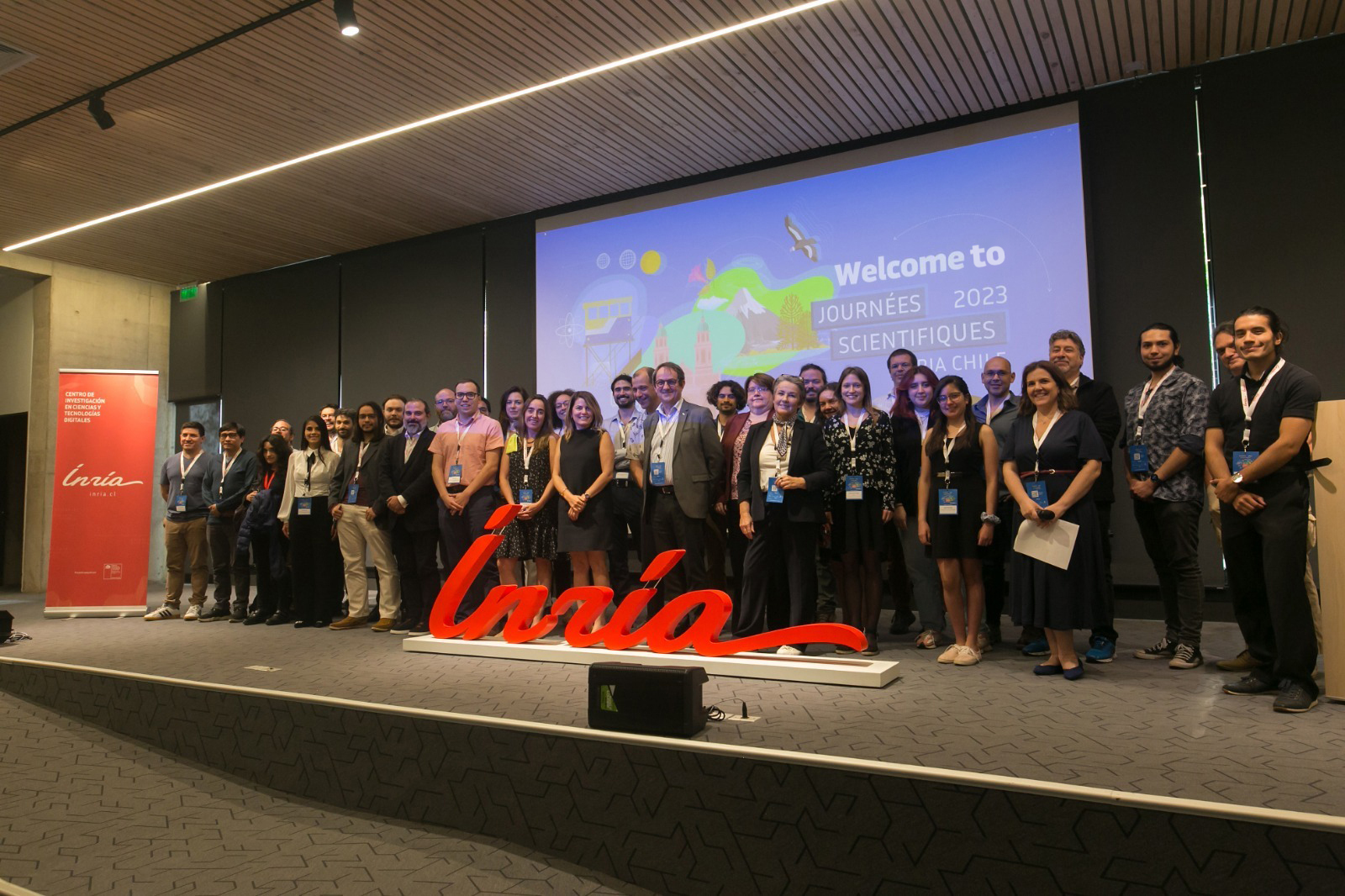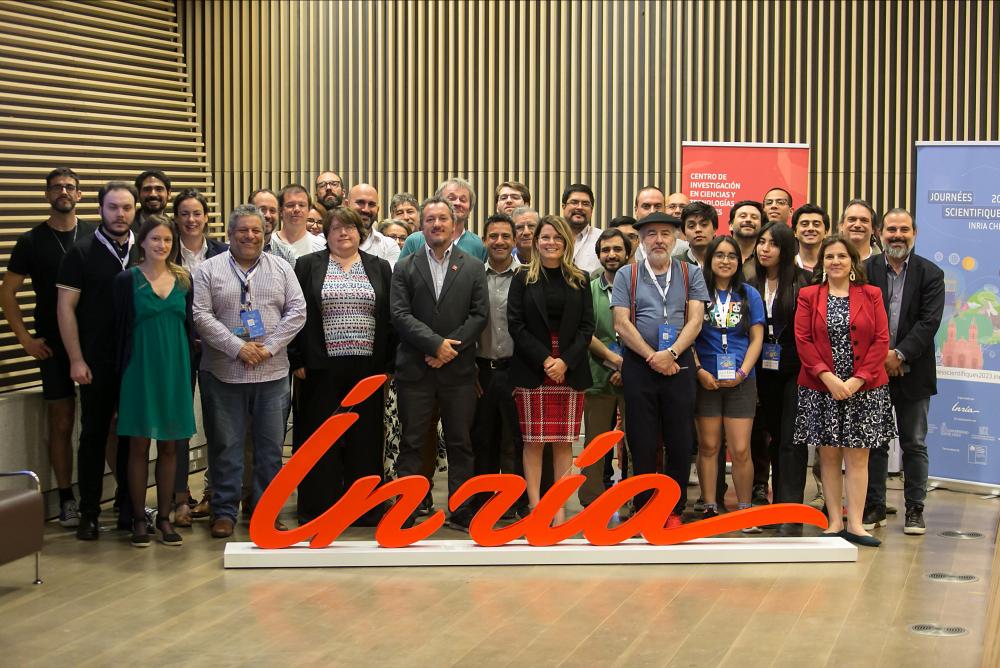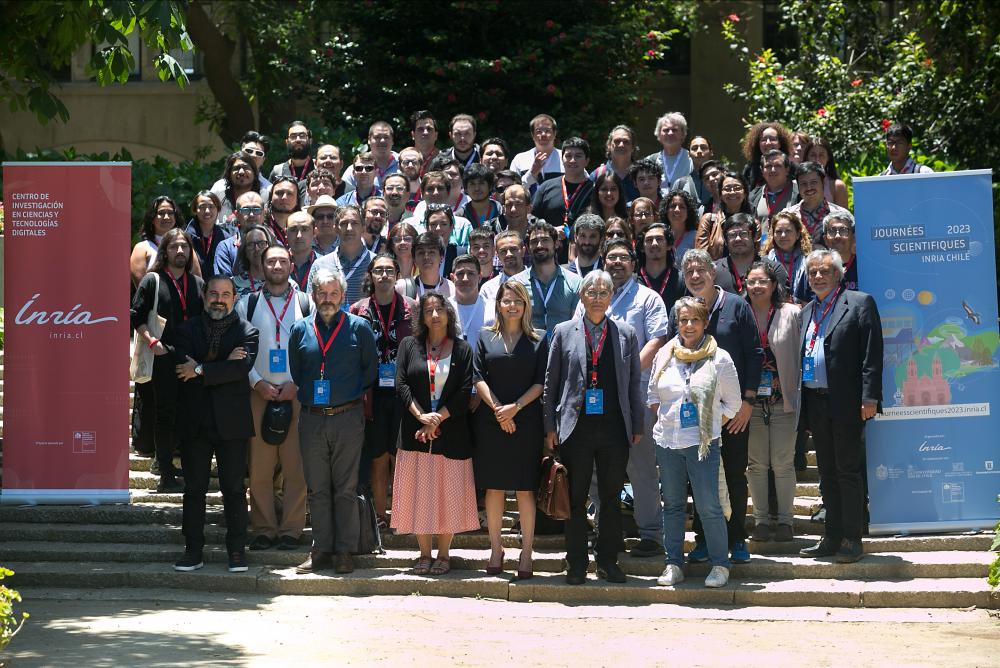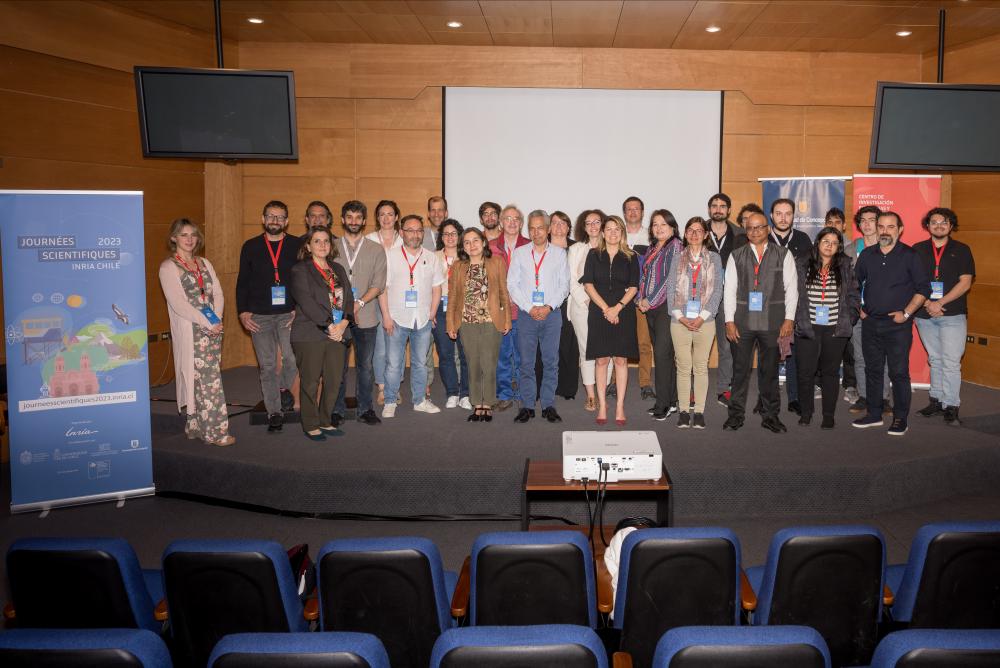
The second edition of the Scientific Days Inria Chile 2023, organized by Inria Chile, took place from December 4 to 7 in collaboration with the Pontificia Universidad Católica of Chile (PUC), the Universidad de Chile, Universidad Técnica Federico Santa María (USM), and the Universidad de Concepción (UdeC). These institutions served as venues for the event, which was held in person for the first time and gathered over 300 French and Chilean researchers, along with online participants who followed the event through the conference website, where the live stream had over 400 views.
This multidisciplinary meeting not only attracted academics but also government officials, entrepreneurs, PhD students, and researchers, establishing itself as a milestone for extending collaboration in digital sciences between France and Chile.
Among the attendees, the participation of Aisén Etcheverry, Minister of Science, Technology, Knowledge, and Innovation of Chile, was noteworthy. She highlighted the opportunity to be part of the Scientific Days. The event also featured other authorities, including Sofia Valenzuela, Regional Secretary for the Central-Southern Macrozone of Science, Technology, Knowledge, and Innovation; Nicole Ehrenfeld, Deputy Director of Centers and Associative Research at ANID; Philippe Vinogradoff, Chargé d’affaires a.i., of the French Embassy in Chile; Jean-Frédéric Gerbeau, Deputy CEO for Science at Inria in France, and representatives from the host universities.
What topics were addressed at this event?
The Scientific Days featured scientific sessions with keynote lectures and presentations on topics such as "Artificial Intelligence," "Model and Data-Driven Methods," "Understanding Natural Processes," "Breakthroughs in Computing," "AI and Modeling Frontiers in Astrophysics," and "Astronomy and Quantum Computing." Over the four days, panel discussions addressed issues where collaboration between France and Chile in various digital fields plays a significant role.
On the first day, the discussion focused on the intersection of digital sciences and the private sector, with representatives from Viña Concha y Toro, Expertise France (Ministry of Energy of Chile), Michelin, and ERAMET. The challenges and specific opportunities facing various industries in France and Chile were explored, such as entering new markets, data-driven business models, and ways in which digital sciences can enhance the competitiveness of French and Chilean companies in strategic areas such as green hydrogen, lithium, logistics, and agriculture. The importance of strengthening synergy between the public and private sectors was also emphasized.
The second day's panel discussed the opportunities that artificial intelligence offers in the context of cooperation between the European Union and countries in Latin America and the Caribbean (LAC). The enabling factors necessary to promote the development of AI in LAC were also addressed.
In the panels held in Valparaíso and Concepción, participants discussed the challenges and possibilities for the Valparaíso and Biobío regions. Topics included how to connect local opportunities with research capabilities in digital sciences, strengthening regional and national capabilities in AI, and the relevance of linking university research with local development strategies. Strategies to strengthen innovation and entrepreneurship at the regional level, bridging the gap between academia and industry, were also explored. In this context, Nayat Sánchez-Pi, Director of Inria Chile, emphasized the relevance of the event.
Verbatim
In these Journées Scientifiques Inria Chile, we created a unique space for the networking of French and Chilean researchers. Moving our scientific caravan to three regions of Chile allowed us to exchange high-level knowledge and open broad collaboration opportunities.
CEO of Inria Chile
She also expressed gratitude for the support of the four partner universities of Inria Chile and highlighted the strategic choice of the venues, "We decided to organize this edition in the heart of our universities in alliance with them to capitalize on a decade of joint work. It is the perfect opportunity to promote the growth of the Franco-Chilean network of Inria researchers, launched last year, and strengthen cooperation in digital sciences."
University authorities agreed on the significant contribution of the initiative to promote cooperation and reaffirm the importance of Franco-Chilean work in digital sciences. Pedro Bouchon, Vice President for Research at the Pontificia Universidad Católica of Chile, highlighted their hosting of the first day and the level of the presentations. "This event brought together distinguished national and French researchers who collaboratively address challenges of great relevance in digital technologies, with a strong focus on Chile and the region," said Bouchon. Marcela Munizaga, Deputy Dean of the Faculty of Physical and Mathematical Sciences at the Universidad de Chile, praised the gathering in the second day held at their institution: "We are pleased, together with Inria Chile, to have convened a very interesting range of researchers on matters that are of great relevance for the future." Andrés Fuentes, Academic Vice President of Universidad Técnica Federico Santa María, highlighted the opportunity to host such an event in Valparaíso. "Receiving an event of this magnitude at our university, in addition to contributing to the construction of networks, strengthens our joint work with Inria Chile."
The Scientific Days concluded on December 7 at the University of Concepción in the Biobío Region, contributing to the decentralization of knowledge and technological innovation. In response, Andrea Rodríguez, Vice President for Research and Development at the Universidad de Concepción, emphasized the importance of enhancing this type of international partnership and having events like the Scientific Days. "We addressed issues of great relevance for our community of researchers, but we also had a strategic meeting to reinforce collaboration between the Ministry of Science, our University, and Inria Chile in digital sciences in the Biobío Region."



